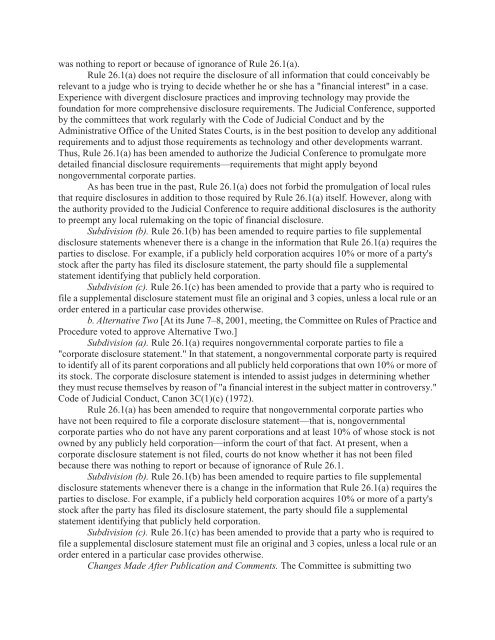Federal Rules of Appellate Procedure 2014-2015, 2014a
Federal Rules of Appellate Procedure 2014-2015, 2014a
Federal Rules of Appellate Procedure 2014-2015, 2014a
Create successful ePaper yourself
Turn your PDF publications into a flip-book with our unique Google optimized e-Paper software.
was nothing to report or because <strong>of</strong> ignorance <strong>of</strong> Rule 26.1(a).<br />
Rule 26.1(a) does not require the disclosure <strong>of</strong> all information that could conceivably be<br />
relevant to a judge who is trying to decide whether he or she has a "financial interest" in a case.<br />
Experience with divergent disclosure practices and improving technology may provide the<br />
foundation for more comprehensive disclosure requirements. The Judicial Conference, supported<br />
by the committees that work regularly with the Code <strong>of</strong> Judicial Conduct and by the<br />
Administrative Office <strong>of</strong> the United States Courts, is in the best position to develop any additional<br />
requirements and to adjust those requirements as technology and other developments warrant.<br />
Thus, Rule 26.1(a) has been amended to authorize the Judicial Conference to promulgate more<br />
detailed financial disclosure requirements—requirements that might apply beyond<br />
nongovernmental corporate parties.<br />
As has been true in the past, Rule 26.1(a) does not forbid the promulgation <strong>of</strong> local rules<br />
that require disclosures in addition to those required by Rule 26.1(a) itself. However, along with<br />
the authority provided to the Judicial Conference to require additional disclosures is the authority<br />
to preempt any local rulemaking on the topic <strong>of</strong> financial disclosure.<br />
Subdivision (b). Rule 26.1(b) has been amended to require parties to file supplemental<br />
disclosure statements whenever there is a change in the information that Rule 26.1(a) requires the<br />
parties to disclose. For example, if a publicly held corporation acquires 10% or more <strong>of</strong> a party's<br />
stock after the party has filed its disclosure statement, the party should file a supplemental<br />
statement identifying that publicly held corporation.<br />
Subdivision (c). Rule 26.1(c) has been amended to provide that a party who is required to<br />
file a supplemental disclosure statement must file an original and 3 copies, unless a local rule or an<br />
order entered in a particular case provides otherwise.<br />
b. Alternative Two [At its June 7–8, 2001, meeting, the Committee on <strong>Rules</strong> <strong>of</strong> Practice and<br />
<strong>Procedure</strong> voted to approve Alternative Two.]<br />
Subdivision (a). Rule 26.1(a) requires nongovernmental corporate parties to file a<br />
"corporate disclosure statement." In that statement, a nongovernmental corporate party is required<br />
to identify all <strong>of</strong> its parent corporations and all publicly held corporations that own 10% or more <strong>of</strong><br />
its stock. The corporate disclosure statement is intended to assist judges in determining whether<br />
they must recuse themselves by reason <strong>of</strong> "a financial interest in the subject matter in controversy."<br />
Code <strong>of</strong> Judicial Conduct, Canon 3C(1)(c) (1972).<br />
Rule 26.1(a) has been amended to require that nongovernmental corporate parties who<br />
have not been required to file a corporate disclosure statement—that is, nongovernmental<br />
corporate parties who do not have any parent corporations and at least 10% <strong>of</strong> whose stock is not<br />
owned by any publicly held corporation—inform the court <strong>of</strong> that fact. At present, when a<br />
corporate disclosure statement is not filed, courts do not know whether it has not been filed<br />
because there was nothing to report or because <strong>of</strong> ignorance <strong>of</strong> Rule 26.1.<br />
Subdivision (b). Rule 26.1(b) has been amended to require parties to file supplemental<br />
disclosure statements whenever there is a change in the information that Rule 26.1(a) requires the<br />
parties to disclose. For example, if a publicly held corporation acquires 10% or more <strong>of</strong> a party's<br />
stock after the party has filed its disclosure statement, the party should file a supplemental<br />
statement identifying that publicly held corporation.<br />
Subdivision (c). Rule 26.1(c) has been amended to provide that a party who is required to<br />
file a supplemental disclosure statement must file an original and 3 copies, unless a local rule or an<br />
order entered in a particular case provides otherwise.<br />
Changes Made After Publication and Comments. The Committee is submitting two


















